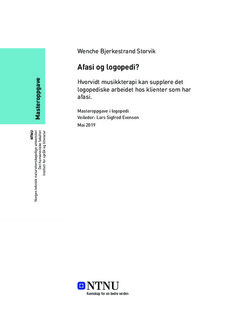Afasi og logopedi?
Master thesis
Permanent lenke
http://hdl.handle.net/11250/2617793Utgivelsesdato
2019Metadata
Vis full innførselSamlinger
- Institutt for lærerutdanning [3814]
Sammendrag
Jeg har valgt å skrive en studie om temaet musikkterapi i logopedisk arbeid med afasi.Bakgrunn: Minst 5000 mennesker får afasi hvert år her i Norge. Afasi er et ord som ikke erså kjent, og når en familie opplever at et familiemedlem får afasi er det sannsynligvis førstegang de hører ordet. Afasi er ervervede (ikke medfødte) språkvansker som oppstår etter enskade i hjernen, og det innebærer som regel vansker med å snakke, forstå det andre sier, leseog skrive. Som regel oppstår denne skaden i venstre hjernehalvdel, og den vanligste årsakener hjerneslag. Hjerneslag er en vanlig sykdom, spesielt hos eldre, og den omfatter bådehjerneblødning og blodpropp i hjernen. Antallet hjerneslag vil sannsynligvis øke de nærmesteårene, fordi vi blir flere eldre i befolkningen.Formål: Formålet med studien har vært å få innsikt i om hvorvidt musikkterapi kan brukessom et supplement til det logopediske arbeidet hos klienter som har afasi. Studien kan værenyttig for logopeder i deres praksis.Problemstilling: Det overordnede temaet for studien er afasi og musikkterapi, og tittelen harjeg valgt å la være like enkel; «Afasi og musikkterapi?» Problemstillingen er som følger:Hvorvidt musikkterapi kan supplere det logopediske arbeidet hos klienter som har afasi.Metode: Prosjektet er en litteraturstudie, der jeg har brukt forskning som allerede eksistererfor å finne svar på problemstillingen. Studien har vist oppmerksomhet til forskning somomhandler afasi hos voksne mennesker etter hjerneslag, og som i tillegg omhandlermusikkterapi eller lignende rehabilitering ved hjelp av musikk.Resultat og konklusjon: Studien presenterer ulike evidensbaserte musikkterapeutiskemetoder og hvilken effekt musikkterapi har, eventuelt ikke har på klienter med afasi. Selv omdet er delte meninger om effekten og at det er vanskelig å få til homogene grupper i forhold tilforskning, så konkluderer likevel studien med at musikkterapi i betydelig grad kan suppleredet logopediske arbeidet hos klienter som har afasi.Nøkkelord: Afasi, musikkterapi, musikterapi, Aphasia, music therapy. I have chosen to write a study on the topic of music therapy in speech therapy with aphasia.Background: In Norway more than 5000 people gets aphasia every year. Apashia is a wordwhich is not so familiar, and when a family experiences aphasia within the family it is mostlikely the first time they hear the word. Apahsia is acquired (not innate) language difficultiesoccurring after a brain injury, and it usually involves difficulties in speaking, understandingwhat is said, reading and writing. Usually this injury occurs in the left hemisphere and themost common cause is stroke. Stroke is a common disease, especially in older people,including both cerebral haemorrhage and blood clots in the brain. The number of strokes islikely to increase over the next years, because of the increase in the number of elderly.Purpose: The purpose of the study has been to gain insight into whether music therapy can beused as a supplement to the speech therapy of clients with aphasia. The study can be useful tospeech therapists in their practice.Topic and research question: The main theme of the study is aphasia and music therapy,and the title is chosen to be just as simple; “Aphasia and music therapy?” The problem is asfollows: Whether music therapy can supplement the speech therapy of clients with aphasia.Method: The project is a literature study, where I have used already existing research to findanswers to the problem. The study has shown attention to research dealing with aphasia ofadults after a stroke, and which also deals with music therapy or similar rehabilitation usingmusic.Result and conclusion: The study presents various evidence-based music therapeuticmethods and what effect music therapy has, or possibly does not have, on clients withaphasia. Even if there are shared opinions on the effect and that is it difficult to obtainhomogeneous groups in relation to research, the study nevertheless concludes that musictherapy can significantly supplement the speech therapy of clients with aphasia.Keywords: Aphasia, music therapy.
